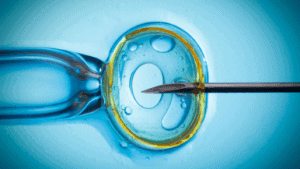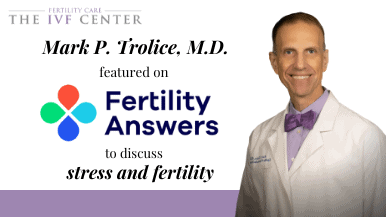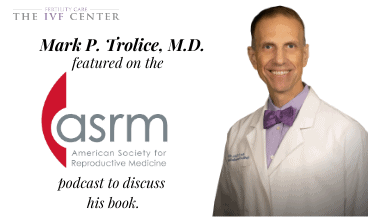After five years of struggling with getting pregnant, Anisa and her husband were referred to Mark P. Trolice, M.D., and the team at The IVF Center by their trusted OB-GYN where they began in vitro fertilization (IVF) treatment. This was a new beginning for the family facing fertility challenges.
“It feels like you’re in the middle of the ocean, and there is no land. It is just you and your significant other. You are just by yourselves, floating. There’s nothing,” she says.
“Then all of a sudden, in the distance, as you are floating and very unsure, you see some trees and little bit of green and for me that’s Dr. Trolice. This light at a very dark tunnel where you realize there is hope, there is someone to help and there is someone to guide you and hold your hand.”
“So many different people say ‘You’re fine,’ ‘You’re just stressed’ or ‘It’s going to be okay,’” says Anisa. “Well, after four and a half, five years of hearing the same thing and it not happening, we have to do something.”
 When years of trying to get pregnant were unsuccessful, Anisa and her husband decided to try IVF treatments.
When years of trying to get pregnant were unsuccessful, Anisa and her husband decided to try IVF treatments.
“The biggest benefit from my first IVF cycle was I got my son, who is three-years-old now,” she says.
After having their first child, Anisa and her husband were hoping that that would be enough to ‘spark’ her body to have a second child, without issues. However, after several more years of trying, they were still struggling to get pregnant with their second child. Again, they turned to Dr. Trolice.
“We decided to come back to see Dr. Trolice and go straight for IVF because we knew we would benefit. Here we are again, [for baby] number two!”
What is In Vitro Fertilization (IVF)?
When a couple has been unsuccessful trying to have a baby, nothing seems more frustrating or more important. IVF may be the answer to help build a family.
 IVF is a fertility treatment in which sperm and eggs are combined in a laboratory. The eggs are retrieved at the point of maturation and are fertilized in the IVF lab. A few days after retrieval and fertilization, the embryos are then transferred to the uterus to initiate pregnancy.
IVF is a fertility treatment in which sperm and eggs are combined in a laboratory. The eggs are retrieved at the point of maturation and are fertilized in the IVF lab. A few days after retrieval and fertilization, the embryos are then transferred to the uterus to initiate pregnancy.
To begin the process, Dr. Trolice will develop a plan that addresses the unique fertility issues of each couple.
Both the male and female partner will be required to come to the office several times for tests and procedures during the treatment cycle. Injection training and further education is also offered on an individual basis to allow for a more personalized experience.
Many different medications are taken during a treatment cycle to assist or enhance the body’s normal reproductive process. Dr. Trolice will establish a schedule of which drugs to take and when to take them in addition to how to administer these medications.
When the woman’s follicles have reached an appropriate stage of development, the eggs will be retrieved using an ultrasound-guided aspiration needle. Once eggs are retrieved and the male partner collects his sperm, the laboratory personnel will perform either natural insemination or Intracytoplasmic Sperm Injection (ICSI) to fertilize the eggs. ICSI is recommended when there is a significant concern over the sperm’s fertilization potential.
After a discussion with the physician, an appropriate number of fertilized eggs (embryos) will be transferred to the uterus to optimize the pregnancy of a single healthy child. A pregnancy test will be conducted about two weeks after egg retrieval to determine if an embryo has implanted and is developing.
“To anyone who is going through this experience, don’t give up. He [Dr. Trolice] is that light. He will give you hope and he will do everything in his power to get you to where you need to be, and all you have to do it trust him,” says Anisa.
Is There a Recovery Period with In Vitro Fertilization (IVF)?
Once the embryo is transferred it is best to rest as much as possible. On the initial day of embryo transfer, it is recommended to rest for the remainder of the day. After the first day of rest, normal activity, such as walking and working, can resume, but it is best to allow the body to rest as much as possible for the following three to four days.
It is recommended to avoid strenuous exercise, chores and even sexual intercourse for about two weeks after the embryo is transferred. In about two weeks a pregnancy test is administered in office. After this, the doctor will recommend whether all normal activities can begin again.
After IVF, movements or activities that may cause contractions of the uterus should be limited as contractions of the uterus could affect the implantation process. In case of complications, it is important to stay near a doctor during treatment. Traveling should be avoided because of the stress that comes with it. If travel is necessary, a physician can suggest the precautions to take.
What Are the Results of In Vitro Fertilization (IVF)?
The team at The IVF Center has performed thousands of successful IVF cycles and have consistently achieved above the national average (55 percent success rates achieving a live birth vs. 40 percent success rate nationally).
 IVF success is affected by many factors including age, height, weight, ovarian reserve tests, sperm count, reproductive history (the number of pregnancies, miscarriages) and clinical diagnosis.
IVF success is affected by many factors including age, height, weight, ovarian reserve tests, sperm count, reproductive history (the number of pregnancies, miscarriages) and clinical diagnosis.
According to RESOLVE: The National Infertility Association, women with the best chances of IVF success have a pregnancy rate of 40 percent or higher for each cycle of treatment, while the majority of women have pregnancy rate of 20-35 percent per treatment cycle.
“For me Dr. Trolice is my miracle. He was what finally gave us hope in a situation where we just didn’t have any anymore. Not once, but twice,” adds Anisa.






